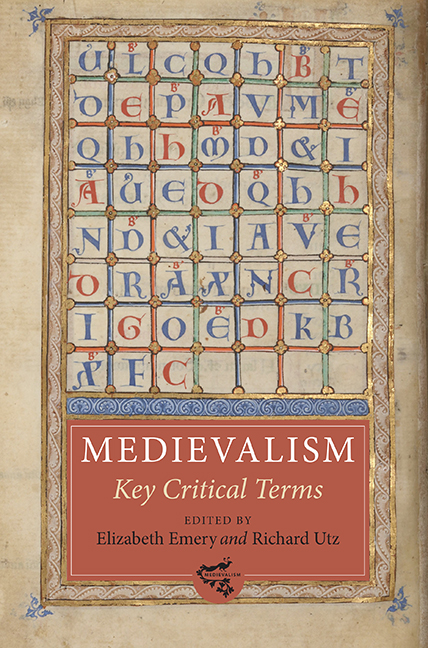Book contents
- Frontmatter
- Dedication
- Contents
- List of Illustrations
- List of Contributors
- Making Medievalism: A Critical Overview
- 1 Archive
- 2 Authenticity
- 3 Authority
- 4 Christianity
- 5 Co-disciplinarity
- 6 Continuity
- 7 Feast
- 8 Genealogy
- 9 Gesture
- 10 Gothic
- 11 Heresy
- 12 Humor
- 13 Lingua
- 14 Love
- 15 Memory
- 16 Middle
- 17 Modernity
- 18 Monument
- 19 Myth
- 20 Play
- 21 Presentism
- 22 Primitive
- 23 Purity
- 24 Reenactment
- 25 Resonance
- 26 Simulacrum
- 27 Spectacle
- 28 Transfer
- 29 Trauma
- 30 Troubadour
- Index
- Medievalism
24 - Reenactment
Published online by Cambridge University Press: 08 October 2022
- Frontmatter
- Dedication
- Contents
- List of Illustrations
- List of Contributors
- Making Medievalism: A Critical Overview
- 1 Archive
- 2 Authenticity
- 3 Authority
- 4 Christianity
- 5 Co-disciplinarity
- 6 Continuity
- 7 Feast
- 8 Genealogy
- 9 Gesture
- 10 Gothic
- 11 Heresy
- 12 Humor
- 13 Lingua
- 14 Love
- 15 Memory
- 16 Middle
- 17 Modernity
- 18 Monument
- 19 Myth
- 20 Play
- 21 Presentism
- 22 Primitive
- 23 Purity
- 24 Reenactment
- 25 Resonance
- 26 Simulacrum
- 27 Spectacle
- 28 Transfer
- 29 Trauma
- 30 Troubadour
- Index
- Medievalism
Summary
THEY ARE WEIRD, let's face it: those who dress up and pretend to be something else; grown men and women who play make-believe. Let's start with that point, that they are weird. Popular culture mocks reenactors, calls them “nerds” or “dorks.” Their hobby is ridiculous. It has no value. It is escapism pure and simple: and escapism is, as we all know, for losers who can't handle the real world. Academics treat them with scorn because they are amateurs who have not paid their scholarly dues and yet have the temerity to speak like experts. They are depressed melancholic losers: thousands of Miniver Cheevys living out pathetic fantasies. In a recent article in Maxim Magazine, Laura Morreale, associate director of the Center for Medieval Studies at Fordham University, said,
There is a tension between academic historians and SCA [Society for Creative Anachronism] folks […] It took me 10 years to get my degree, and there's a notion that they just have to go out and live it and it's more real. But from a business perspective, we need people who are passionate about history.
Ah! But in a postmodern world, where professionalism and expertise are devalued, monoculture has been replaced by various sub-cultures, and nerds rule; the tables have been flipped. These amateurs have often been studying their period for years, sometimes decades, sometimes for a whole life. They perform incredibly well-designed experiments in experimental archeology or performance reconstruction. They are often more invested in the field, in terms of time and money, than are some tenured professors. Besides, “weird” is the new “normal,” which means they can't be weird. Recently, through the efforts of Ken Mondschein of the Higgins Armory, as well as the Chicago Sword Guild, and La Belle Compagnie (a reenactment company), reenactment has been making serious headway gaining entry into academia, in a series of panels at the International Congress on Medieval Studies in Kalamazoo that have focused on the intersection between academia and reenactment. Reenactment is suddenly legitimate.
Why do they do it? (Ok, confession time: we.4) Why dress up and pretend to be Elizabeth or Bayard or a twelfth-century peasant blacksmith? What can be gained from this form of play and, more importantly, how are we (academics) supposed to write about it? This chapter looks at reenactment as both an activity and as a critical term for scholars of medievalism.
- Type
- Chapter
- Information
- Medievalism: Key Critical Terms , pp. 207 - 214Publisher: Boydell & BrewerPrint publication year: 2014

